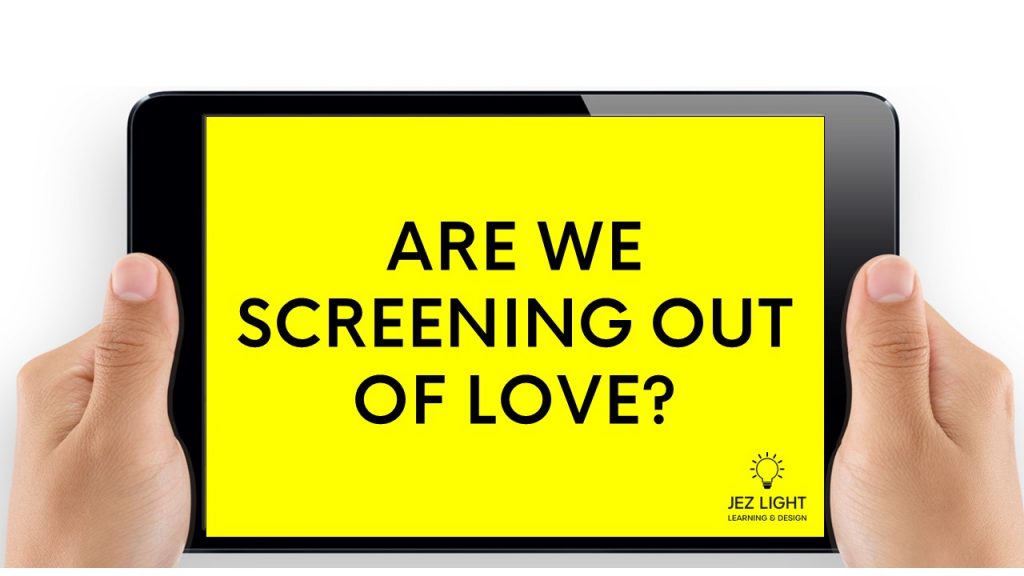Are we screening out of love?
By now pretty much every organisation will have given into the power of a screen for a meeting, catch up, training session or information download. They arrived in a virtual flash, like a knight on a white horse, galloping into our lives and saving the proverbial day. Fast forward to 2021 and they’ve been with us for some time now, taking over our lives in both work and social situations.
It’s starting to become a little less ‘hero’ and a little more ‘frenemy’,
No article these days is complete without a little data. The Harvard Business School recently completed some excellent research and we’ve taken inspiration from it for this piece.
By the end of this post, we think we’ll have given you a glimmer of hope to help you reignite some va-va-voom into your za-za-zoom by using the lost art of telling great stories.
Anyway, back to the study, which polled over 3 million people across 16 global cities and came back with one resounding fact (that likely won’t really shock you).
Since March 2020, the average workday has increased and we’re attending more meetings than ever before!
The research found that we’re working on average nearly 50 minutes! (or 8.2%) per day in the new world which we’ve found ourselves in.
Those extra meetings we’re all attending? For most of us, it’s an extra 2 a week being squeezed into our schedules (but for some many more as suspected micro-managing kicks in).
The way we are experiencing these meetings? Yep, you’ve guessed it, most of them are courtesy of our knight in slightly tarnished armour, the virtual screen.
What you’ll undoubtedly start seeing soon, if not already, is the start of ‘screen fatigue’. Each meeting becomes an led powered blur, your eyes begin to tire under the strain to constantly make eye contact. The need to look engaged and interested is essential now there’s no longer an escape from the ever-present glassy gaze of the camera.
A single flinch, a suspect eye roll, a pensive lip bite, or even just a quick distracted gaze out the window can now give the wrong message to every other person in a meeting. Just. Like. That.
You’ll be finding by now that people are less and less remembering to try to engage others in a virtual meeting. The initial flurry of ice breakers, challenges, check-ins, polls, chats, videos and even having ‘mandatory fun’ have just dried up. All of a sudden, the virtual meeting has become such a familiar part of the daily routine that we’re suffering burn out from an amazing tool, expedited by its global usage through a pandemic.
If you’re delivering or experiencing training, then the job is now a little harder. It’s difficult to get a temperature check on the room when everyone’s face is made of cold hard pixels.
And if the camera is off? Well, that’s surely a sign of either poor WIFI or maybe a case of ‘I don’t want to be here’.
You can’t always see faces because there’s a clunky slide deck or another shared screen in the way. Something designed to connect us, is in some cases, now having the opposite effect.
So, how do we save virtual screens from the ultimate unfriending?
We need to fall back into our original lovefest with screens and virtual meetings. We need to remember to use the medium we have to its fullest. We need to add some rich beautiful media, images, icons & music. It’s now time to treat ourselves again to extra servings of engaging videos and fun interactions and then liberally sprinkle them across our meetings and training sessions just like we do with chocolate over our fancy cappuccinos (skinny with nut milk of course)
Let’s rediscover the love and excitement for the use of a poll and bring back the sparkle in our eyes when a chat box pops open, just like when we did in the honeymoon period. It’s time to rekindle those feelings and there’s one trick up our sleeve that could truly save the day. Storytelling.
Learning to tell a great story.
We need to remember to tell engaging and insightful stories to our listeners, whoever they might be.
This is proven to be an effective way to capture and then hold onto people’s valuable attention, and guess what? A story, well told, is so much more valuable and easier to recall compared to boring old facts and miserable old bits of data.
Remember most of the old wife’s tales you know, but aren’t quite sure why or how you remember them? You’re confused that these stories have stuck in your minds so well when you cannot remember your 18th secure log in password of the day? That’s because you were told it as a story, and lo and behold, it stuck.
Now, not everyone can tell a story, but it’s not rocket science. A little structure goes a long way.
You need a defined beginning, middle and end. Long drawn-out meetings – we’re looking at you.
You need to draw the listener in, with something enticing, a hook if you like, so the listener is in no doubt about the all-important ‘what’s in it for me’?
A good story always has a hero and a bad guy to help prove your points and bring the situations to life. Your bad guy might take the form of budget cuts, but you use him just the same.
If you want to end on a high, then finish up with a ‘moral of the story’ situation. Proves a point. Ends the story. Resonates, and everyone loves a moral high ground. Fact!
Now. If you’re still on the fence then bear in mind that data (again) tells us that when we share anything, it’s shown to be up to 20 times more memorable when told as a story, within a meeting, a speech, a training event or webinar. Or even just a good old actual story.
So, there’s many of us right now who might be at that moment in our virtual relationship where our attention might be straying, our heads turned by another app or platform. We might still be pining for our long-lost love of the classroom or meetings room (remember them?) and seeing real faces sat on real bottoms on real chairs, but that’s not quite within our grasp just yet.
In the meantime, we’ll be reinvesting a little more time and attention into the stories we tell, and the ways and means we tell them via virtual screens and not stamping out those still warm embers of our love affair with virtual training just yet.

